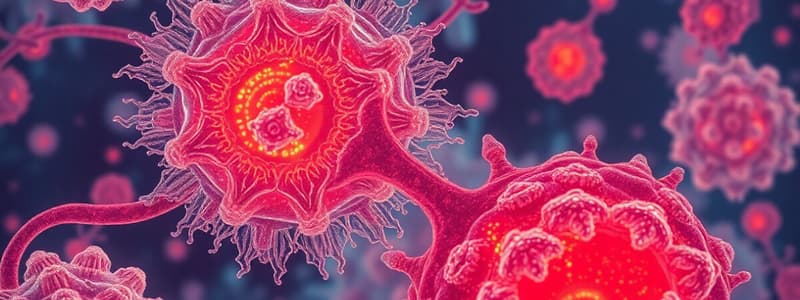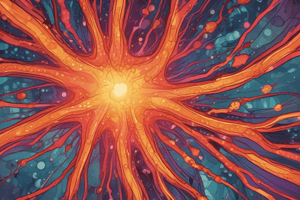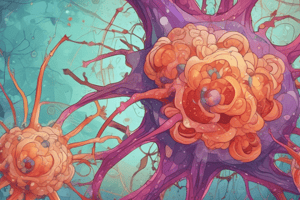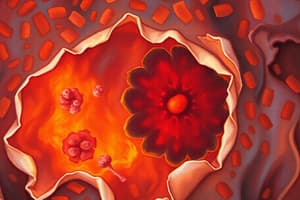Podcast
Questions and Answers
What is one primary purpose of inflammation?
What is one primary purpose of inflammation?
- Create a permanent barrier against any damage
- Eliminate all pathogens from the body
- Increase blood flow to the site of injury (correct)
- Reduce blood flow as a response to stress
Which type of cell is primarily involved in the inflammatory response?
Which type of cell is primarily involved in the inflammatory response?
- Endothelial cells
- Leukocytes (correct)
- Epithelial cells
- Muscle cells
Which of the following is NOT one of the five cardinal signs of inflammation?
Which of the following is NOT one of the five cardinal signs of inflammation?
- Redness
- Swelling
- Loss of coordination (correct)
- Heat
Which cells release histamine, TNF-a, and IL-16 during an inflammatory response?
Which cells release histamine, TNF-a, and IL-16 during an inflammatory response?
What role do endothelial cells play in inflammation?
What role do endothelial cells play in inflammation?
Which leukocyte is mainly responsible for combating parasitic infections?
Which leukocyte is mainly responsible for combating parasitic infections?
What is the function of platelets during inflammation?
What is the function of platelets during inflammation?
What are plasma-derived mediators primarily responsible for?
What are plasma-derived mediators primarily responsible for?
What role does C-Reactive Protein (CRP) play in the body?
What role does C-Reactive Protein (CRP) play in the body?
Which complement protein is the most abundant?
Which complement protein is the most abundant?
What is the primary function of bradykinin in the kinin system?
What is the primary function of bradykinin in the kinin system?
Which type of inflammation is characterized as an early and immediate reaction to injury?
Which type of inflammation is characterized as an early and immediate reaction to injury?
What effect do corticosteroids have on inflammatory mediators?
What effect do corticosteroids have on inflammatory mediators?
What is an example of a pre-formed cell-derived mediator?
What is an example of a pre-formed cell-derived mediator?
Which of the following eicosanoids is associated with the inflammatory response in asthma and anaphylaxis?
Which of the following eicosanoids is associated with the inflammatory response in asthma and anaphylaxis?
What is the primary substance that forms the fibrous meshwork in the coagulation system?
What is the primary substance that forms the fibrous meshwork in the coagulation system?
Flashcards
Purpose of inflammation
Purpose of inflammation
Inflammation is a complex biological response to harmful stimuli, such as pathogens, damaged cells, or irritants. It aims to eliminate the initial cause of cell injury, clear out damaged cells and tissues, and initiate the process of tissue repair.
Endothelial cells & inflammation
Endothelial cells & inflammation
Endothelial cells line blood vessels and act as a selective barrier. They regulate blood flow, trigger the extravasation of leukocytes (white blood cells) to the site of injury, and produce mediators that regulate inflammation and immune cell activity, as well as contribute to the repair process.
Leukocytes (WBC) in inflammation
Leukocytes (WBC) in inflammation
Leukocytes are the main cellular players in inflammation. Different types (like neutrophils, eosinophils, basophils, mast cells, lymphocytes, and monocytes/macrophages) have specific roles in the immune response, targeting and destroying pathogens, or aiding in tissue repair.
5 cardinal signs of inflammation
5 cardinal signs of inflammation
Signup and view all the flashcards
Plasma-derived mediators
Plasma-derived mediators
Signup and view all the flashcards
Cell-derived mediators
Cell-derived mediators
Signup and view all the flashcards
Neutrophils in inflammation
Neutrophils in inflammation
Signup and view all the flashcards
Monocytes and inflammation
Monocytes and inflammation
Signup and view all the flashcards
Acute Inflammation
Acute Inflammation
Signup and view all the flashcards
C-Reactive Protein (CRP)
C-Reactive Protein (CRP)
Signup and view all the flashcards
Complement System
Complement System
Signup and view all the flashcards
Vasodilation
Vasodilation
Signup and view all the flashcards
Vascular Stage
Vascular Stage
Signup and view all the flashcards
Eicosanoids (Prostaglandins, Leukotrienes)
Eicosanoids (Prostaglandins, Leukotrienes)
Signup and view all the flashcards
Study Notes
Purpose of Inflammation
- Removes injured tissue, preparing the site for healing
- Establishes a physical barrier against infection and further damage
- Alerts healing products to attend the injury site
- Increases blood flow to the injury site
- Interacts with the adaptive immune system
Cellular Components of Inflammation
Endothelial Cells
- Line blood vessels, creating a selectively permeable barrier
- Produce vasodilators/vasoconstrictors to regulate blood flow
- Regulate leukocyte extravasation (movement out of blood vessels)
- Synthesize/release inflammatory mediators, regulating immune cell proliferation
- Contribute to repair processes through growth factor production
- Stimulate angiogenesis (new blood vessel formation) and extracellular matrix formation
Leukocytes (White Blood Cells)
- Major cellular component of the inflammatory response
- Granulocytes: Multi-lobed nucleus
- Neutrophils: 60-70% of WBCs, crucial in early response; first responders
- Eosinophils: 2-3% WBCs, involved in allergic reactions and parasitic infections
- Basophils: <1% WBCs, key role in allergic responses (release histamine)
- Mast cells: Release histamine, TNF-α, IL-1β, growth factors, also involved in allergic reactions
- Agranulocytes: Single nucleus
- Monocytes: Develop into macrophages; phagocytosis, antigen presentation
- Lymphocytes: T cells and B cells; crucial in adaptive immunity
- T lymphocytes: cell-mediated immunity
- B lymphocytes: antibody-mediated immunity
Platelets
- Help stop bleeding
- Inflammatory stimuli activate platelets, releasing adhesion molecules
5 Cardinal Signs of Acute Inflammation
- Redness: Vasodilation (increased blood flow)
- Swelling: Increased vascular permeability, allowing fluid to leak into tissues
- Heat: Increased blood flow
- Pain: Release of inflammatory mediators, pressure on nerve endings
- Loss of function: Swelling impedes tissue/organ function
Inflammatory Mediators
Plasma-Derived Mediators (Liver-Synthesized)
- Acute-phase proteins: Increased during inflammation
- C-reactive protein (CRP): Marker for inflammation and infection
- Complement system: Proteins that destroy pathogens directly
- Classical, Lectin, Alternative pathways
- Coagulation system: Forms fibrous meshwork for wound repair
- Fibrin (primary substance)
- Kinin system: Causes pain and blood vessel dilation
- Bradykinin (primary kinin)
Cell-Derived Mediators (From Cells at Inflammation Site)
- Pre-formed: Already present in cells
- Mast cells: Histamine
- Platelets: Serotonin
- Newly synthesized: Produced in response to stimuli
- Leukocytes: Prostaglandins (ASA/NSAIDs block), leukotrienes (Asthma/anaphylaxis mediator), PAF
- Macrophages/Lymphocytes/Endothelial cells: Cytokines (e.g., TNF-α, IL-1), Chemokines, Nitric Oxide (NO), Reactive Oxygen Species (ROS)
Acute vs. Chronic Inflammation
- Acute: Initial, immediate reaction to remove injury, limit damage
- Chronic: Persistent inflammation, lasting longer, often due to persistent injury/infection
Studying That Suits You
Use AI to generate personalized quizzes and flashcards to suit your learning preferences.
Description
This quiz covers the purpose of inflammation and the various cellular components involved in the inflammatory response. It highlights the roles of endothelial cells and leukocytes in healing and immune regulation. Test your knowledge on how these cells contribute to the inflammation process.




